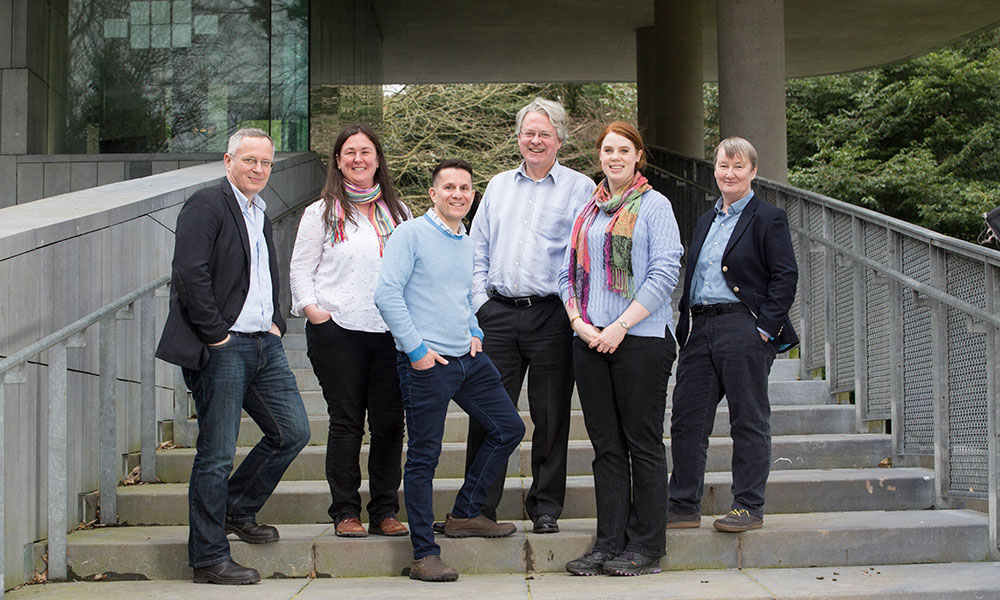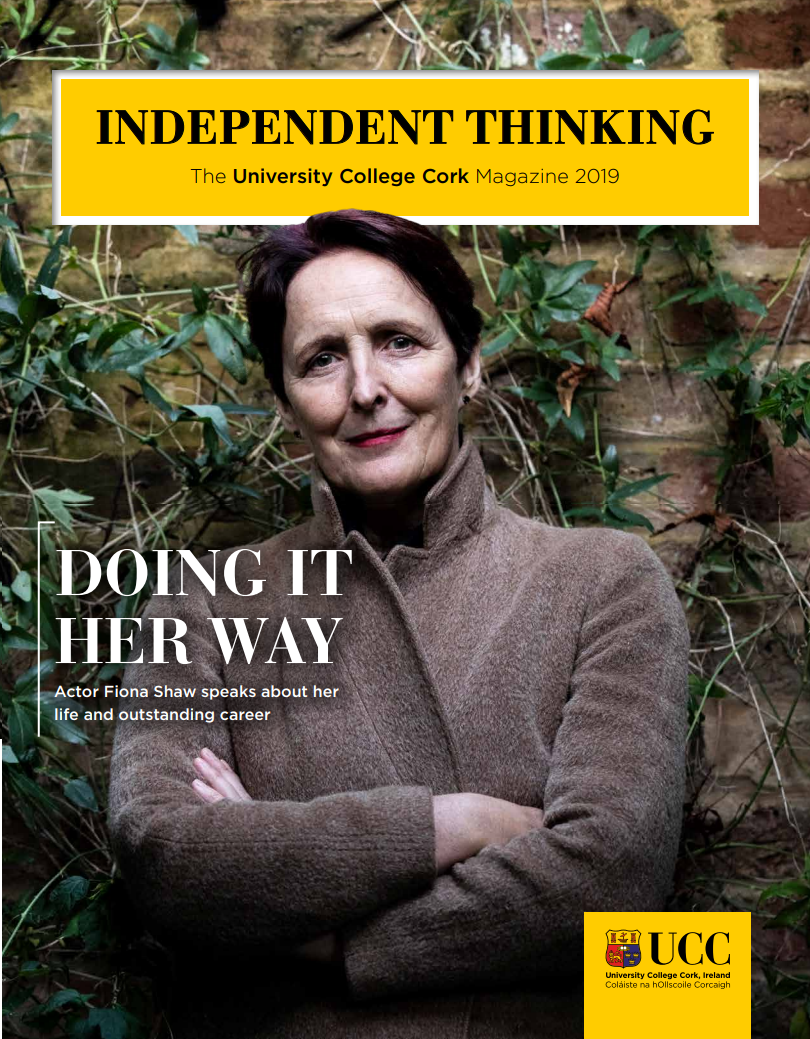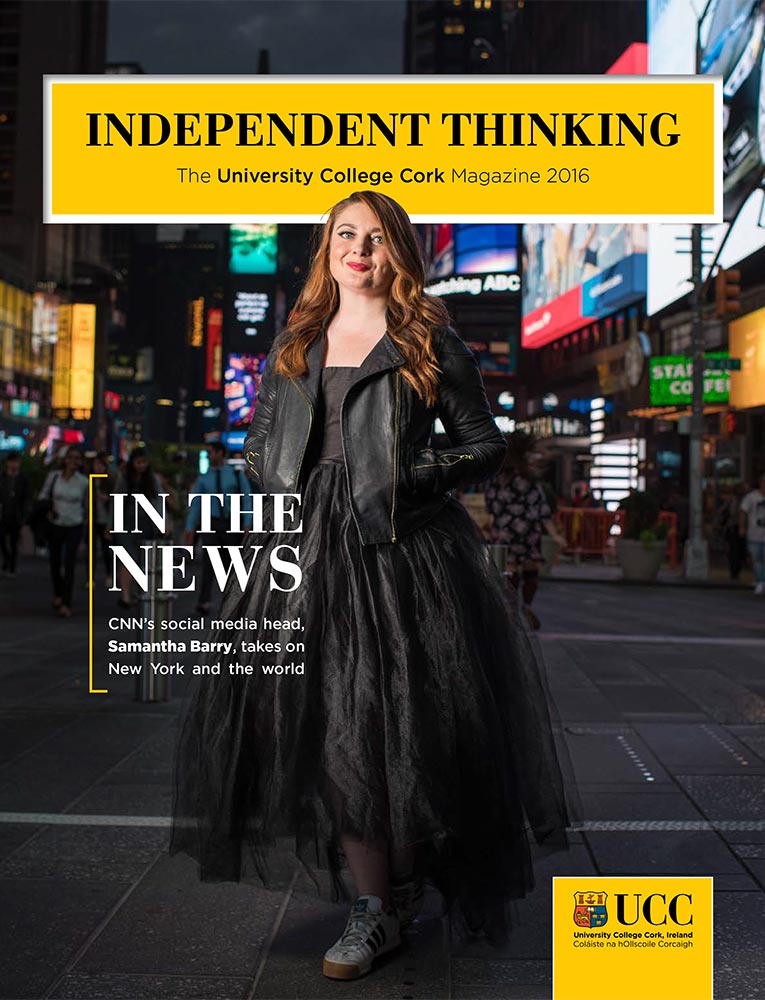Features
- Can Do, Will Do
Stefanie Preissner
- It’s not just a gut feeling
John Cryan & Ted Dinan
- Active citizen
Emily Duffy
- Leading the charge
Alan Hayes
- Gaeltacht adventures
Bliain Na Gaeilge
- Eachtraí sa Ghaeltacht
Bliain Na Gaeilge
- Don’t worry, bees happy
Fiona Edwards Murphy
- The times they are a-changin’
LGBT Staff Network
- Back to her roots
Maria Kirrane
- Shining a light
Mental Health in the Community
- Patrick’s call to nursing was no accident
Patrick Cotter
- A healthy separation, long overdue
Ivan Perry
- Woman of Steele
Susan Steele
The times they are a-changin’
Robert O’Sullivan speaks to members of the LGBT Staff Network at UCC about its origins, what it has achieved during its first 10 years, and how Ireland has changed its perspective on gender and sexuality issues over that decade.

It was founded in February 2008 with the goal of making UCC a better place for LGBT-identifying staff members. But the launch of the LGBT Staff Network was a far cry from a similar event just 20-odd years before, when a group attempting to form a ‘Gay Society’ for students were rebuffed by the university’s organising bodies and outright prohibited from officially forming, for several years.
In the years since then, not only did the university’s mindset change, but so did the nation’s – the most notable change being the decriminalisation of homosexuality in 1993.
Cathal Kerrigan, who was present for both of these launches, recalls the welcoming atmosphere they received when founding the Staff Network: “What was really significant for us, as staff members, is that vice-presidents and senior members of university management turned up there to support it. So, in that sense, we weren’t even pushing an open door; the door was opened and we were invited in, and that was really very big, psychologically.”
The main aim at that stage was to be a visible and welcoming group for LGBT staff working in the university, and it certainly did that – organising talks, debates and events within the college, as well as social occasions for its members.
As time went on, and the Network changed and grew, so did Irish society. The most relevant – and public way – Irish society changed came in 2015 with the civil marriage referendum. The Staff Network took an active role in the campaign, holding a public ‘town hall’ debate in the college, as well as campaigning for a yes vote as a group and as individuals.
They did not rest on their laurels, as they campaigned for the repeal of the eighth amendment – with UCC Staff Together for Yes – and they worked on the university’s gender identity and expression policy, which will help trans students and staff in UCC to feel more welcome in the college for years to come.
“What we’re trying to do is be mindful and acknowledge the gains which have been made, but also to look forward and keep pushing the boundaries,” says Laurence Davis.
The Network, according to its terms of reference, pledges to work with other groups, both within the university and outside it.
This is followed through with talks and events co-organised with the student-run LGBT Society, but also with groups like GENOVATE – the action research project which focuses on gender equality in research innovation in partner universities, and the Athena SWAN programme, which awards and recognises universities that take an active role in encouraging female academics and researchers in STEM fields.
Whether it’s different minorities or groups, we work together, we rise together, and we rose together with the support of a lot of people in UCC. Therefore, we wanted to reach out to see if we could help others.
Members of the LGBT Staff Network have been on the steering group for the Athena SWAN efforts in UCC, both as individuals and as representatives of the Network. The intersectional nature of the group is reflected in their efforts to also work on events regarding race, ethnicity, religion and more, providing an LGBT perspective in the relevant field.
“Rather than just looking inwards, and saying ‘well, how can this help LGBT people?’ we want to look outwards as well,” says Laurence. “We recognise, as in the old ‘Industrial Workers of the World’ model, an injury to one is an injury to all. We recognise that an injury – whether it’s on the grounds of race, ethnicity, religion or membership of the Travelling Community – that this is an injury to all, and I think we’ve tried to be very mindful in developing a broad base of the equality agenda.”
Not content with working for people in UCC itself, the UCC LGBT Staff Network took an active role in helping other networks to form in other universities. It wasn’t long before they heard the clarion call from people wanting to set up their own networks in their colleges.
In the intervening decade, similar LGBT staff networks have been set up, for instance in Trinity College Dublin, University College Dublin and NUI Galway.
“We researched throughout Ireland, Britain, and America, to see what other networks were like. In the universities where there were some, we made contact with them.
"We saw it very much as, ‘ar scáth a chéile a mhaireann na daoine’; we all live in each other’s shadow, we help each other grow,” says Cathal Kerrigan.
“Whether it’s different minorities or groups, we work together, we rise together, and we rose together with the support of a lot of people in UCC. Therefore, we wanted to reach out to see if we could help others there,” he adds.
It’s clear that no matter how much progress has been attained since February 2008, there are still wrongs to be righted, and work to be done. So, where might the LGBT Staff Network be in 10 years’ time?
This is part of something much, much bigger – we may only be doing a little bit, but it’s part of the much bigger jigsaw.
“I think where this network will be, is fundamentally tied as well to where society at large will be, and connected by that to where the economy will be,” says Mary O’Rourke.
“I hope all of us who are in this privileged situation – whether it’s as a staff member or as a student, will contribute to the equality agenda in the broadest sense, including economic and income inequality.
“As we’ve seen in other times and in other countries, social reversion and disruption are often triggered by economic crises, and I would be worried that while there may be prosperity, it’s not prosperity for everyone. This is part of something much, much bigger – we may only be doing a little bit, but it’s part of the much bigger jigsaw,” she says.
“No one has a crystal ball, we can’t say with any certainty what it will be like in 10 years’ time; and without sounding like a harbinger of doom, I think we have to be vigilant, to try to keep pushing in small ways, and see the interconnectivity in it all,” adds Mary.
In the last 10 years we have seen civil marriage being extended to same-sex couples, legal recognition extended to transgender people, a gay son of an immigrant elected Taoiseach, and the country modernised by the people of Ireland – in the ballot box and in everyday life.
One certainty amidst whatever change comes, is that the LGBT Staff Network will be there doing its bit to help our forever interconnected society.
To find out more about the UCC LGBT Staff Network, visit www.ucc.ie/en/lgbtstaff.



